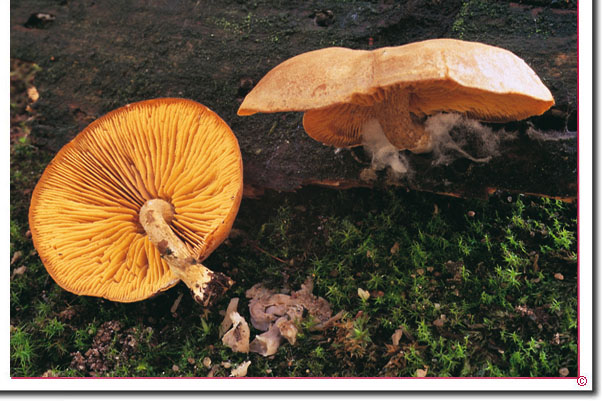
Der Gelbblättrige Goldrübling Callistosporium luteo-olivaceum
wurde 1978 von Rolf Singer als Callistosporium favrei zu Ehren Favres beschrieben
Jules Favre (1882-1959) war ein schweizerischer Mykologe. Er hat sich schwerpunktmäßig mit der Pilzflora der Schweizer Alpen beschäftigt. Er ist der Autor des "Catalogue descriptif des Champignons superieurs de la Zone subalpine du Parc Nationale Suisse"
und "Les Champignons supérieurs de la Zone alpine du Parc National Suisse".
Pilze, die zu Ehren von Jules Favre beschrieben wurden:
Callistosporium favrei Singer 1978, Callistosporium luteo-olivaceum, Tricholomataceae
Clitocybe favrei Kühner & Romagn. 1953, Tephrocybe langei, Lyophyllaceae
Cortinarius favrei D.M. Hend. 1958, heute Cortinarius alpinus, Cortinariaceae
Entoloma favrei Noordel. 1982, Entolomataceae
Galerina favrei Bon 1986, Cortinariaceae
Hebeloma favrei Romagn. & Quadr. 1985, Cortinariaceae
Helvella favrei Quél. 1902, Helvellaceae
Inocybe favrei Bon 1985, Inocybaceae
Inocybe favrei-cavipes Bon 1997, Inocybaceae
Lactarius favrei H. Jahn 1982, Russulaceae
Lepiota favrei Kühner 1983; Agaricaceae
Lepiota favrei Kühner ex Bon 1993, Agaricaceae
Marasmius favrei Antonín 1990; Marasmiaceae
Melanoleuca favrei Bon 1990, Tricholomataceae
Myceloblastanon favrei M. Ota 1925, heute Candida albicans, eine Anamorphe der Saccharomycetales
Mycena favrei Maas Geest. 1991, Mycenaceae
Mycenella favreana E. Horak 1987, Tricholomataceae
Myxacium favrei M.M. Moser 1955, heute Cortinarius alpinus, Cortinariaceae
Omphalina favrei Watling 1977, Tricholomataceae
Pluteus favrei Antonín & ©kubla 2000, Pluteaceae
Pseudohiatula favrei Tuom. 1953, Tricholomataceae
Ramaria favrei Quél. 1894, heute Clavaria favrei, Clavariaceae
Ramaria favreae Quél. 1894, heute Ramariopsis kunzei, Clavariaceae
Russula favrei M.M. Moser 1979, Russulaceae
Tricholoma favrei R. Haller Aar. & R. Haller Suhr 1949, derzeit Lyophyllum favrei, Lyophyllaceae
Jules Favre selber hat offenbar niemanden aus dieser Autorenliste mit Ehrentaxa bedacht.
